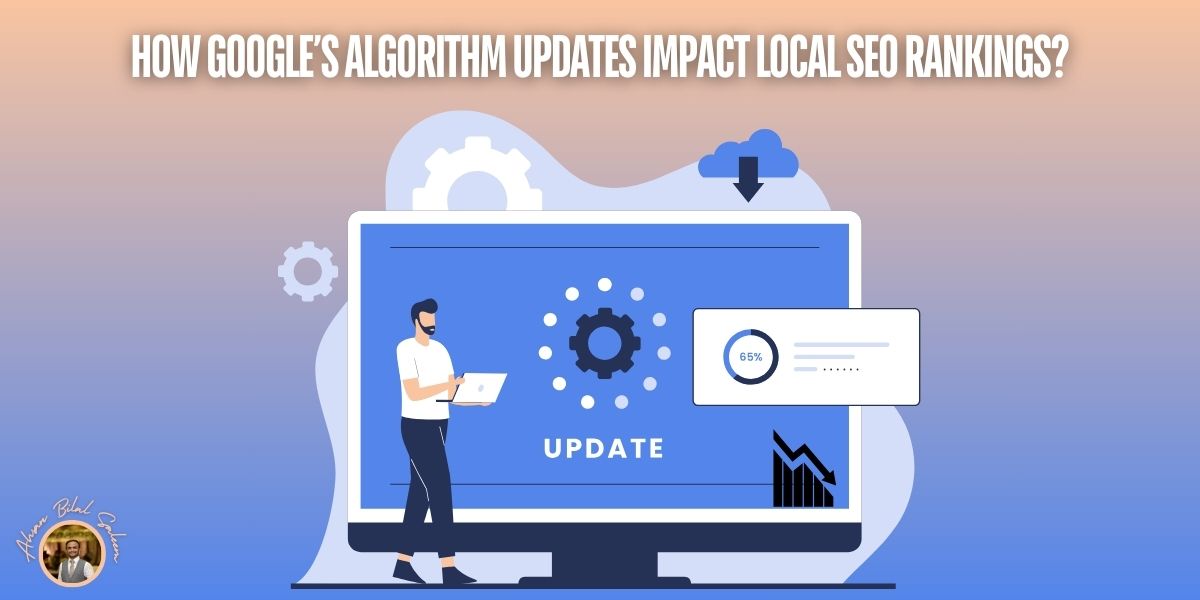How Google’s Algorithm Updates Impact Local SEO Rankings?
Google’s algorithm updates are notorious for shaking up the search engine results pages (SERPs), and businesses that rely on local SEO are not immune to these changes. As Google continuously refines its algorithms to improve search accuracy and relevance, local SEO rankings can be directly affected, influencing how local businesses appear in search results. Understanding these updates and how they impact local SEO rankings is crucial for maintaining visibility and attracting customers. In this article, we will explore the relationship between Google’s algorithm updates and local SEO rankings, identify key updates that have impacted local businesses, and offer strategies to help you adapt and stay competitive.
What Are Google’s Algorithm Updates?
Google’s algorithm updates are changes to the way its search engine ranks websites. These updates are designed to improve the quality and relevance of search results, ensuring that users find the most accurate and valuable information based on their queries. Some updates are minor tweaks, while others are significant overhauls that can dramatically shift search rankings across industries.
For local businesses, Google’s algorithm updates often have a specific focus on improving local search results, which makes understanding their impact essential for maintaining a competitive edge in local SEO.
The Connection Between Google’s Algorithm and Local SEO
Local SEO centers around improving a business’ web-based presence to draw in clients from explicit geographic regions. This involves ranking for location-based searches, such as “coffee shop near me” or “best dentist in Chicago.” Since Google wants to provide users with the most relevant local information, local businesses are subject to the same algorithm updates as global businesses, with some updates specifically targeting local search behaviors.
When Google updates its algorithm, it can alter how it evaluates local search ranking factors, such as:
- Google My Business (GMB) Listing: Google often adjusts how it prioritizes GMB listings in local results. This includes factors such as completeness of the profile, reviews, business category, and consistency of Name, Address, Phone number (NAP) data.
- Proximity: Google continuously refines how proximity impacts search rankings. Some updates may give more importance to how close a business is to the searcher, while others may focus more on relevance or prominence.
- Local Reviews: Updates may influence how Google weighs customer reviews, including factors like review quantity, quality, and frequency.
- Citations and Backlinks: The quality and quantity of local citations and backlinks can also be affected by algorithm updates, leading to shifts in local search rankings.
Key Google Algorithm Updates and Their Impact on Local SEO
Several major Google algorithm updates have had significant impacts on local SEO. Below are some of the most important updates and how they changed local search rankings:
Pigeon Update (2014)
The Pigeon update was a distinct advantage for local SEO. It improved the way Google handled location-based searches by tightening the relationship between local search results and traditional web search ranking signals. After this update, businesses that had strong SEO on their websites saw better local rankings.
Impact on Local SEO:
- Increased importance of traditional SEO signals (on-page optimization, backlinks, etc.) for local rankings.
- Better integration of Google Maps with local search results, making GMB optimization essential.
Possum Update (2016)
Possum aimed to diversify local search results by increasing the relevance of businesses located just outside city limits. It also filtered out duplicate listings and businesses with similar addresses, preventing them from showing up multiple times in local results.
Impact on Local SEO:
- Broadened the local search radius, benefiting businesses on the outskirts of cities.
- Made proximity to the searcher more important, influencing businesses to focus on hyper-local SEO strategies.
Hawk Update (2017)
The Hawk update refined the filtering introduced by Possum. It prevented businesses with similar addresses from being unfairly filtered out of local results, allowing them to rank independently based on their own merits.
Impact on Local SEO:
- Gave businesses in close proximity a better chance to rank if they had strong SEO signals.
- Encouraged businesses to differentiate themselves with unique content, services, or customer experiences.
Medic Update (2018)
While the Medic update basically designated wellbeing and health sites, its attention on the expertise, authority, and trustworthiness (E-A-T) of websites impacted local SEO across all businesses. Local businesses were expected to improve the quality of their content and online reputation to rank higher in local searches.
Impact on Local SEO:
- Elevated the importance of high-quality content and authoritative backlinks for local businesses.
- Increased focus on customer reviews and online reputation as trust signals.
Vicinity Update (2021)
The Vicinity update brought significant changes to local SEO rankings by emphasizing proximity and relevance. This update decreased the ranking power of businesses trying to rank in locations far from their actual address and gave more weight to those that were physically close to the searcher.
Impact on Local SEO:
- Businesses now need to focus more on local relevance, ensuring their website content, keywords, and GMB listings reflect their actual location.
- Increased importance of proximity, making it harder for businesses to rank in distant areas.
How to Adapt to Algorithm Updates for Local SEO
Algorithm updates are inevitable, but you can take proactive steps to ensure your local SEO efforts stay aligned with Google’s evolving criteria. Here’s how you can adapt:
Optimize Your Google My Business (GMB) Profile
Your GMB listing is the cornerstone of local SEO, so keeping it fully optimized is essential. Ensure your business name, address, and telephone number (Rest) are precise and predictable across the web. Consistently update your posting with photographs, posts, and significant data, like business hours or exceptional advancements.
Focus on Earning Positive Reviews
Google places a lot of weight on customer reviews, and this trend is likely to continue. Encourage satisfied customers to leave reviews on your GMB listing and other review platforms. Answer audits (both positive and negative) to show commitment and obligation to client care.
Prioritize Local Content
Algorithm updates often favor businesses that provide relevant, local-focused content. Ensure your website features blog posts, service pages, and other content tailored to your community or target audience. Highlight local events, news, and tips that show your business is actively engaged with the area.
Keep Citations Consistent
Consistency in citations (mentions of your business name, address, and phone number) across the web is crucial. Make sure that your NAP details are identical on your GMB listing, website, and other online directories like Yelp and Yellow Pages. This helps Google verify your location and business legitimacy.
Optimize for Mobile Search
Local searches are often conducted on mobile devices, and Google has shifted its algorithms to reflect this trend. Ensure your website is mobile-friendly with responsive design, fast loading times, and easy navigation. This will not only improve user experience but also boost your local rankings.
Use Location-Based Keywords
While proximity is important, your content still needs to reflect local relevance. Incorporate location-based keywords into your website content, including titles, meta descriptions, and service pages. For example, use terms like “plumber in Austin” or “best pizza in Brooklyn” to target local search queries.
Stay Updated with Google’s Announcements
Keep an eye on announcements from Google regarding algorithm changes, especially those related to local search. Regularly checking resources like Google’s Webmaster Blog, SEO news sites, and forums will keep you informed of upcoming updates and give you time to adjust your strategy.
Conclusion
Google’s algorithm updates have a significant impact on local SEO rankings, affecting how businesses are seen by local customers. From updates like Pigeon and Possum to more recent changes like the Vicinity update, understanding the focus of each update is essential to maintaining visibility in local search results. By staying proactive with your GMB optimization, review management, and local content strategy, you can adapt to these updates and ensure your business continues to rank high in local searches, bringing more foot traffic and customers to your door.










